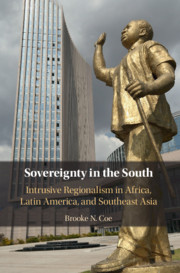Crossref Citations
This Book has been
cited by the following publications. This list is generated based on data provided by Crossref.
Tieku, Thomas Kwasi
Gänzle, Stefan
and
Trondal, Jarle
2020.
People who run African affairs: staffing and recruitment in the African Union Commission.
The Journal of Modern African Studies,
Vol. 58,
Issue. 3,
p.
461.
Suzuki, Sanae
2021.
Interfering via ASEAN? In the Case of Disaster Management.
Journal of Current Southeast Asian Affairs,
Vol. 40,
Issue. 3,
p.
400.
Magu, Stephen M.
2021.
Explaining Foreign Policy in Post-Colonial Africa.
p.
265.
Suzuki, Sanae
2021.
Intervention and state strength: Association of Southeast Asian Nations and Economic Community of West African States compared.
International Area Studies Review,
Vol. 24,
Issue. 1,
p.
35.
Agostinis, Giovanni
and
Closa, Carlos
2022.
Democracies’ support for illiberal regimes through sovereignty-protective regional institutions: the case of UNASUR’s electoral accompaniment missions.
European Journal of International Relations,
Vol. 28,
Issue. 2,
p.
417.
Stapel, Sören
2022.
Regional Organizations and Democracy, Human Rights, and the Rule of Law.
p.
237.
Stapel, Sören
2022.
Regional Organizations and Democracy, Human Rights, and the Rule of Law.
p.
277.
Stapel, Sören
2022.
Regional Organizations and Democracy, Human Rights, and the Rule of Law.
p.
1.
Stapel, Sören
2022.
Regional Organizations and Democracy, Human Rights, and the Rule of Law.
p.
201.
Elliott, Christian
Bernstein, Steven
and
Hoffmann, Matthew
2022.
Credibility dilemmas under the Paris agreement: explaining fossil fuel subsidy reform references in INDCs.
International Environmental Agreements: Politics, Law and Economics,
Vol. 22,
Issue. 4,
p.
735.
Söderbaum, Fredrik
and
Stapel, Sören
2022.
Regionalism in Africa and External Partners.
p.
61.
Palestini, Stefano
and
Martinelli, Erica
2023.
Enforcing peoples’ right to democracy: transnational activism and regional powers in contemporary Inter-American relations.
European Journal of International Relations,
Vol. 29,
Issue. 3,
p.
780.
Coe, Brooke
and
Nash, Kathryn
2023.
Regionalized Governance in the Global South.
Schulz, Carsten-Andreas
and
Levick, Laura
2023.
Regional patterns of multilateral treaty cooperation: Is there a Latin American ‘commitment gap’?.
International Political Science Review,
Vol. 44,
Issue. 3,
p.
316.
Mansour, Imad
and
Thompson, William R.
2023.
Turmoil and Order in Regional International Politics.
Vol. 10,
Issue. ,
p.
143.
Lohaus, Mathis
and
Stapel, Sören
2023.
Who commits to regional human rights treaties? Reputational benefits, sovereignty costs, and regional dynamics.
Journal of Human Rights,
Vol. 22,
Issue. 3,
p.
386.
Söderbaum, Fredrik
and
Stapel, Sören
2023.
Regionalismus in Afrika und externe Partner.
p.
69.
Spandler, Kilian
Hartelius, Julia
Monti, Alva
and
Söderbaum, Fredrik
2024.
Sovereignty scripts and regional governance: ASEAN’s response to the Covid-19 pandemic.
The Pacific Review,
Vol. 37,
Issue. 3,
p.
604.
Kwasi Tieku, Thomas
Trondal, Jarle
and
Gänzle, Stefan
2024.
The behavioural logics of international public servants: the case of African Union Commission staff.
Cambridge Review of International Affairs,
Vol. 37,
Issue. 3,
p.
315.
Libman, Alexander
2024.
Hidden Transformation of Authoritarian Regionalism: Tracing Organizations’ Functions Through Officials’ Biographies.
Politische Vierteljahresschrift,



